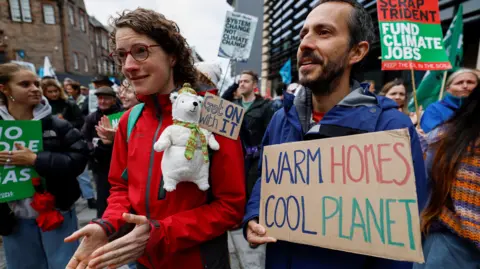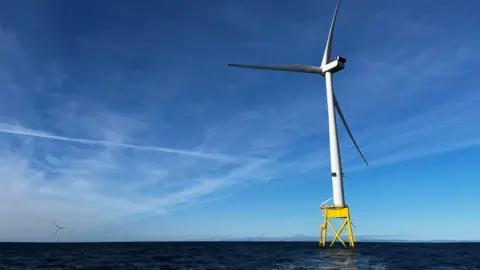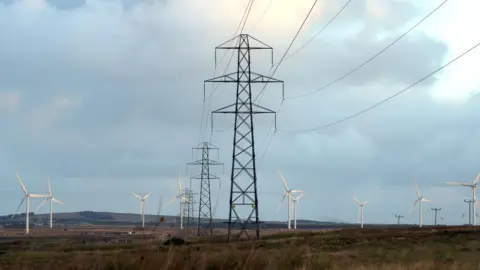Experts propose new Scottish climate change targets
 Getty Images
Getty ImagesIndependent experts have proposed a new set of targets to tackle climate change in Scotland over the next 20 years.
Annual targets were abandoned by the Scottish government last year after repeatedly being missed – but ministers retained the pledge to reach net zero by 2045.
The Climate Change Committee (CCC) says that to meet that goal, emissions need to fall by an average of 57% over the next five years and by 69% to 2035, when compared with 1990 levels.
The Scottish government says it will consider the report's recommendations carefully but is expected to adopt the targets in the coming weeks.
The government had set its original climate change targets in 2019 – which included reducing emissions by 75% by 2030.
Two years later, ahead of the UN's COP26 climate talks in Glasgow, then First Minister Nicola Sturgeon described the targets as "amongst the most ambitious anywhere in the world".
But they were ditched in 2024 after the government's independent advisers, the CCC, warned that they were no longer achievable.

The most recent data, for 2022, shows that planet-warming greenhouse gas emissions fell by 50% against the 1990 baseline year.
The committee's analysis now suggests that the 75% reduction milestone should be met in 2036 - six years later than previously planned.
The CCC says that getting to net zero by 2045 will require "immediate action, at pace and scale".
Net zero is the point where we stop adding more carbon dioxide to our atmosphere.
Rather than setting targets for each year, emissions will now be calculated in carbon budgets across five-year time intervals.
This is in line with how they are calculated across the UK and allows for weather-related fluctuations, for example by burning more gas to generate heat during colder winters.

The committee has made a series of recommendations and published advice on how the targets can be achieved in its 130-page report, although it will be for ministers to decide which steps to take.
The recommendations include prioritising the switch to electric vehicles and heat pumps over the next decade.
The CCC says this would involve significant upfront investment which would cost the economy around £750m a year over the next 25 years - about 0.4% of Scotland's GDP.
It says that will result in a net saving by the early 2040s as electric vehicles (EVs) are cheaper to run than petrol or diesel models and heat pumps are more efficient to operate than gas boilers.
The committee has recommended to the UK government that electricity should be made cheaper, and says this is essential to making low-carbon heating affordable.

It also says that renewable power generation needs to keep pace with the change.
It says Scotland could more than triple the amount of electricity generated from wind and solar over the next decade.
But that would require significant expansion of the transmission grid with new, larger pylons - and there has already been significant opposition from communities affected by new pylon routes, including in the Mearns in Aberdeenshire.
The report expects that by 2035 around three-fifths of cars and vans on Scottish roads will be fully electric, compared with just 2.2% for cars in 2023.
The falling cost of batteries means it anticipates EVs costing the same as petrol and diesel vehicles over the next three years.
The committee also predicts that 40% of existing homes will be heated by low-carbon technologies like heat pumps in the next 10 years. That would require about 35,000 installations each year by 2030.
But it says the Scottish government must promise immediate policy support, after a previous pledge to require homeowners to install green heating in homes at the point of sale was scrapped earlier this year.
'Lightbulb moment'
The committee also says nature-based climate measures - including tree planting and peatland restoration – could contribute to 13% of emissions reductions by 2045.
It says the rate of planting needs to more than double, with the amount of Scotland's land covered by forestry rising from 19% to 23% over the next two decades.
Last year the committee raised "serious concerns" after Scottish ministers announced a 41% cut to its woodland creation budget, admitting they would fall well short of the target to plant 18,000 hectares each year.
The Scottish government will now consider the CCC's 130-page report.
After the embarrassment of having to scrap the previous targets, it is unlikely to deviate from the new recommendations.

Environmental groups say it is important that ministers take the urgent action outlined in the report.
WWF Scotland says it should be a "lightbulb moment" for ministers while Oxfam Scotland says it is time to stop the "delay and dither" and start delivering.
Mike Robinson from the Stop Climate Chaos Scotland coalition added: "Climate action is not optional.
"The Scottish government must now heed the CCC's advice, move on from discussing targets and whether we need to act to making it happen, and get Scotland's climate journey back on track."
Acting Net-Zero Secretary Gillian Martin said the advice would be considered carefully before setting carbon budget levels.
She added that they "must provide an achievable pathway to net zero in 2045 – one which delivers better health outcomes, puts more money in people's pockets, and leaves no workers behind".
